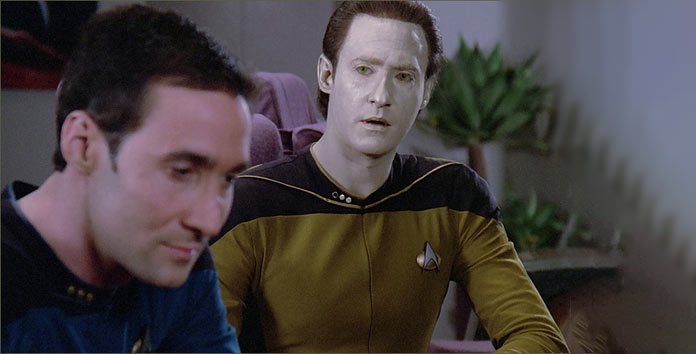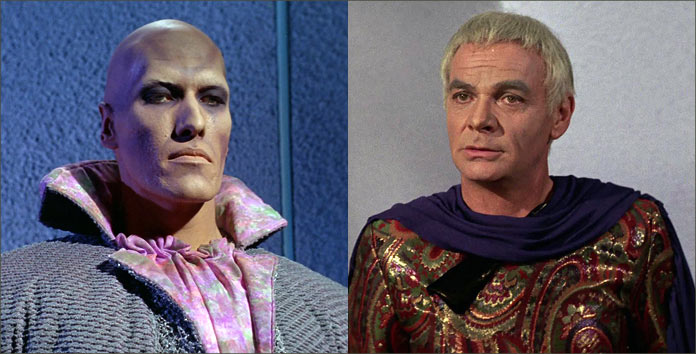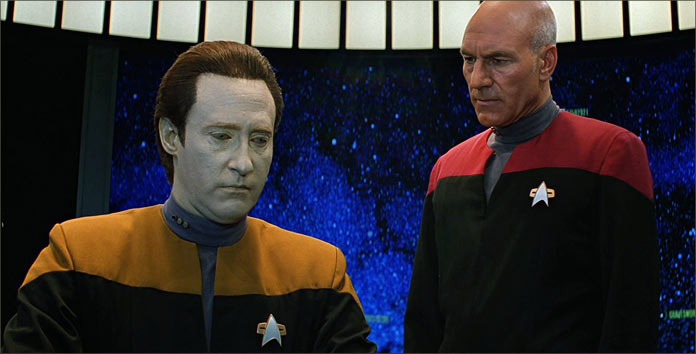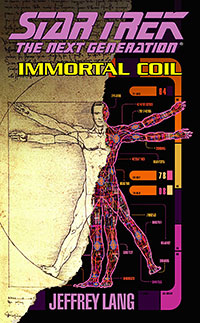He is perhaps the ultimate human achievement: a sentient artificial life-form — self-aware, self-determining, possessing a mind and body far surpassing that of his makers, and imbued with the potential to evolve beyond the scope of his programming.
Created by one of the most brilliant and eccentric intellects the Federation has ever known, the android Data has always believed he was unique, the one true fulfillment of a dream to create children of the mind.
But is he?
Investigating the mysterious destruction of a new android created by Starfleet, Data and the crew of the U.S.S. Enterprise uncover startling secrets stretching back to the galaxy’s dim past.
That knowledge is coveted by beings who will stop at nothing to control it, and will force Data to redefine himself as he learns the hidden history of artificial intelligence.
We’re counting down to the January 2020 return of Jean-Luc Picard by revisiting some of the pivotal stories about the beloved Starfleet captain — and his crew — from across the last three decades of Star Trek: The Next Generation published fiction.
Welcome to the next entry in our retro review series Prelude to Picard!
* * * *
Jeffrey Lang’s Star Trek: The Next Generation — Immortal Coil is the best novel about the character of Data published to date. Published in 2002 and set during the middle of the Dominion War, the novel follows the crew of the Enterprise-E as they are drawn into a centuries old conflict between artificial lifeforms after a mysterious accident puts Commander Bruce Maddox, Data’s one time adversary — sometimes colleague — into a coma.
Star Trek: Picard will see the return of Brent Spiner to the role of Data for the first time since the character’s death in 2002’s Star Trek: Nemesis, and while many of the details about his appearance are being kept under wraps, but the series trailers released to date do suggest that he’ll appear to Jean-Luc Picard in some form or another — whether it be by hologram or in dreams.
We have been led to believe that Data’s story — or at least, his legacy — will be an important subplot for the series, and if so, I hope that it explores the same kinds of themes as Immortal Coil. What does it mean to be an artificial lifeform? Is Data unique? What makes him special?

There has always been a bit of an inconsistency between the portrayal of androids and other artificial life forms between Star Trek in its original incarnation, and Star Trek: The Next Generation. In The Next Generation, Data is presented as a wondrous invention, and his uniqueness forms the basis of many plots for the series. But Kirk and crew encountered many an constructed being in their voyages, like the androids of Exo III, Reyna, Mudd’s women, just to name a few.
Immortal Coil helps to reconcile this inconsistency, weaving together many of the appearances of artificial intelligence throughout Star Trek’s history. Data’s creator Noonian Soong was a protégé of the immortal human Flint (from “Requiem for Methuselah”), who created Rayna and perfected his knowledge of artificial intelligence drawing on learning from other cultures and civilizations, such as the androids of Exo III.
It is those androids who come back to haunt Flint — who now goes by the name Emil Vaslovik — after an expedition by Flint, Soong, and Ira Graves to the planet awakens Ruk’s companions. Faulty androids who were built by a race with a desire to evolve but no way to do so, the androids have been driven insane and consumed by rage.

In their rage, they seek out the latest breakthrough in artificial intelligence — a successful effort by Bruce Maddox, Flint, and Reginald Barclay to build a positronic brain using holographic technology. This new android is sought after by the androids of Exo III as the potential solution to their problems. They attempt to steal it, but Flint is several steps ahead of them; using the opportunity to abscond with the android but make it look like it has been destroyed.
Enter Data and the Enterprise-E crew, tasked with trying to piece all of this together. Along for the ride, the Enterprise’s new chief of security Rhea McAdams, who Data falls in love with thanks to his emotion chip. It is revealed that McAdams is actually the new android, hidden away aboard the Enterprise to conceal her from those who would attempt to use her for their own purposes.
And as if that wasn’t enough cool ideas or concepts, Picard and the Enterprise crew are assisted by representatives of a fellowship or artificial intelligences from across the cosmos, including some familiar and some new faces. There is even a very surprising role for another artificial intelligence from that appeared during the run of The Next Generation.
You might, after reading all this, be feeling like Immortal Coil is an over-stuffed mélange of various different characters an ideas from Star Trek and The Next Generation all clamoring for room to breathe. But surprisingly, it isn’t.
The story works, the way it weaves together elements of the canon is innovative, and overall the story is a lot of fun. It opens as a whodunit murder mystery and expands from there to add new perspective to Data but also flesh out some Original Series episodes too.

And through it all, Data shines the loudest. Lang is one of the few authors who successfully integrates Data’s new emotion chip into the storytelling, providing the character with the opportunity to explore feelings he never previously had. Data deals with grief, feeling lost about his place in the universe, romance, wonder, anger, and joy, and Lang takes us through a journey of the character experiencing all of it.
But, while emoting, the character is still very much Data. By the time Nemesis rolled around, the decision had been made to ditch the emotion chip idea entirely. It seems the writers were too afraid of it making the character something different. But Jeffrey Lang proves you can both tell a great Data story and make it an emotional journey for the character. Data needs to grow in order to remain fresh, and Immortal Coil provides a breath of fresh air for the character.
And even though this is a Data story, there are some great scenes between Data and his captain that echo back to their conversation about dealing with emotion in Stellar Cartography in Star Trek: Generations. Picard is, in many ways, a mentor for Data along his emotional journey. It is clear that Picard cares very much for Data and his well-being, and it appears some of those ideas are going to be picked up in Star Trek: Picard.

Given this series is about focusing on the elements of these books that might hold some resonance for Star Trek: Picard, I won’t dwell on the many Original Series elements that Immortal Coil deftly deploys. But the return of Flint, who is a fascinating character in his own right, is a welcome one.
Overall, Immortal Coil provides an emotional journey for Data that was sorely lacking from his post-Generations appearances on screen, that has valuable things to say about artificial intelligence, emotion, and companionship. Data can be a tough character to nail, or to have something fresh to say about, and Jeffrey Lang accomplishes that in the midst of spinning a fun adventure.
Here’s hoping Star Trek: Picard does the same.

